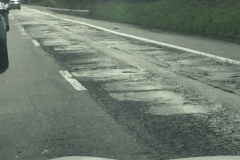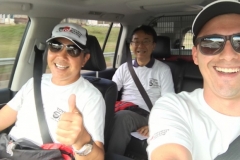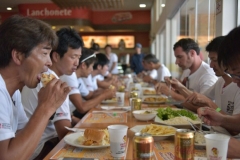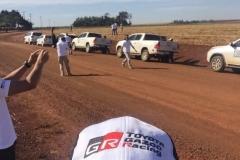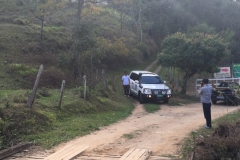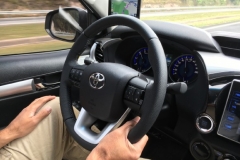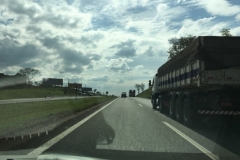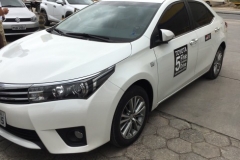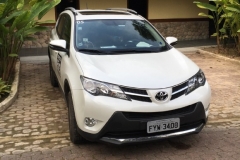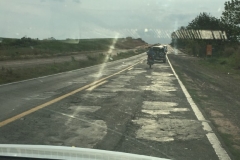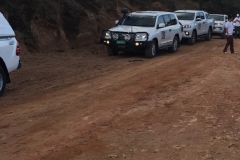Something we heard from a dealer in the seaside resort city of Fortaleza was that the most often replaced part on Hiluxes driven by the police was the battery. Even when they park the truck by the beach and go on foot patrols, they don’t stop the engine. Because they leave the air conditioner on for long periods of time while the truck is stopped, they say the battery can’t get charged up again. This town shows us another unique way our vehicles are used. A team of technicians assembles in front of worn-out police vehicles that operate in the field 24 hours a day. Meanwhile, Miyazaki from the Rental Lease Business Division continues interviewing a dealer behind them.
In Japan, events at department stores and the like are typically designed to get people to visit a dealer, but in Brazil, people sign contracts at these events and the dealer might easily run out of inventory. This one behavior of buying a car gives another peek into the nature of the people.
Miyazaki comments, “My job is to take the ‘goods’ that our engineers and technicians make and turn them into explainable ‘products.’ My work is connecting the people who make the goods with the people who sell the products, but they share the same goal of delivering ever-better cars to customers.”
Miyazaki makes a point of communicating not just with dealers but also with the members of the project team, looking for clues from the differences between Brazil and Japan as to how to better deliver products.
Departing Fortaleza on our first South American leg of the project over 600 km, we encounter demonstrators who have set tires on fire and blocked a street as well as a wildfire on the shoulder of the road. The roadsides are full of people even though we’re on a highway, but the team members are no longer fazed by the environment that is so different from Japan. Even on the first long drive, the team is more focused on car performance than on the outside environment. Each time when they stop to change drivers, they share their thoughts on things like the importance of seat performance and the inefficiency of ethanol fuel, which is standard in Brazil. At the destination of Teresina, the temperature doesn’t fall below 30°C even after dark.
Rough streets show a curious phenomenon.
One reason our Brazilian team members wanted to show us scorching hot Teresina was to drive on streets made up of a hodgepodge of stones of various sizes that could barely be called cobblestone. Sekiya from the Talent Training Division drives a new Prius on a road so bumpy that it seems as if someone has actually dug holes in it. He feels good about the suspension, which lives up to its reputation of having improved quite a bit. “Even when it’s bumpy, it doesn’t jolt you,” he says, praising the suspension’s rigidity while complaining that it’s difficult to brake at low speed. Even though braking is no problem on paved roads at low speed, it bothers him somehow that subtle brake-work is needed on rough stone streets. The reason why isn’t immediately clear, but more linearity is needed. Sekiya seems pleased as he remarks on how curious it is. There must be room for innovation when a reason is not understood.
We fly over to Rio de Janeiro, meet up again with the Land Cruiser 200, and journey to the mountainous city of Campos do Jordão. Whether driving on the highway, on winding mountain roads, or on rough off-road mountain trails, the “king of 4WD” offers its signature stability. Kato from the Vehicle Technology Development Division drives the LC200 while comparing it to his own car, an old Land Cruiser 70. Kato handles conformance testing for control systems like ABS and knows quite well that the level of required performance varies from person to person. The Land Cruiser 70 has almost no new features, and then there’s the LC200. He says that because the Land Cruiser has intentionally kept its core components the same while finding innovative ways to evolve, he feels a responsibility to give people what they want.
“Even if we can’t deliver custom-built cars, I think we at least have to make cars that fit the country. I was reminded of this while watching how Brazilians use the emergency brake when they drive,” he adds.
To know what features people need in Brazil, we must drive on all its varied streets. When we were off-road driving before going over the mountain to Campos do Jordão, we crossed paths several times with ranchers on horseback. They must need to ride horses to travel off the roads to their grazing lands. Or, maybe horses are easier to handle on the steep slopes and sharp curves so precarious they’re almost inconceivable in Japan. The LC200 certainly has no problem off-road driving. What features are needed on roads where horses are the mode of transportation? Perhaps Kato has found a new topic to ponder.
Etch Brazil in our minds to recall it for development.
Sato, from the Engine Control System Development Department characterizes his two weeks of driving in Brazil like this.
“Actually driving in an unknown environment and just hearing about it as information to absorb carry two different weights. I’ll remember Brazil’s landscape when I’m developing systems.”
It may look chaotic, but if you nudge your car out into the street someone will let you in. He says he got a feel for Brazilians’ admirable traits while driving around the country. He’s involved in developing idling stop technology, whose introduction is legally mandated in 2019. What results will he produce when he returns to the workplace where he can directly utilize this experience? What each person takes back from the drive project is different, but as Miyazaki mentioned in his conversation with the dealer, the goal is the same: delivering ever-better cars to people around the world. With that thought in mind, the four team members participating in the first half of the project bid farewell to Brazil.
